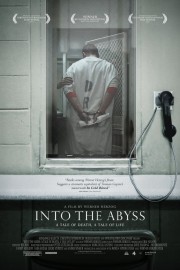Into the Abyss: A Tale of Death, a Tale of Life
The idea of three people being murdered just for a car is, to say the least, stupid. But then again, I guess we live in a country where a woman will pepper spray people to get a damn Xbox on Black Friday. What the Hell is wrong with some people?
While I would love to watch a film where Werner Herzog, the German master of such haunting documentaries as “Grizzly Man” and “Cave of Forgotten Dreams,” takes on that Black Friday mom, for now I’ll settle for “Into the Abyss,” in which he looks at a 2001 triple homicide in Texas that led to two teenagers, Michael Perry and Jason Burkett, being convicted of the crimes. At the time of his interviews, Perry is 8 days away from his execution date, while Burkett is serving a life sentence, with his first chance for parole not until 2041. The guilt of the two men is of no doubt; we are presented with the facts, which all point to Perry and Burkett. What Herzog wants us to consider, though, is the notion of capital punishment and the idea of an “eye for an eye” when it comes to taking a human life.
The film begins with a fascinating interview with a preacher in Texas who recalls a story about when he was on a golf course, driving a golf cart, when all of the sudden two squirrels dart in front of him. He puts on the breaks just as the squirrels stop. After a moment, they run off to continue their lives. The preacher’s point with this story is to compare that with the death penalty; he’s been with several prisoners in their last moments, and he laments that they are, too often, not allowed the same second chance.
The preacher, however, is only the first of Herzog’s compelling interviews. We hear from Perry and Burkett, who are accepting of their fates; Burkett’s father, who is in prison for an unrelated crime, and who testified on his son’s behalf at the time of Jason’s sentencing– by taking parental responsibility for his son’s transgressions, Burkett’s father likely saved his son from Perry’s fate; the brother of one of the victims, who also has spent time in jail; the daughter and sister of the other two victims, who shut down after their deaths, and whom doesn’t have a phone, because it’s brought her only bad news over the years; a former warden at the prison in Texas where many of the executions take place, and whom quit after he couldn’t take the emotional toll anymore; and Jason Burkett’s wife, who met him in prison, married him, and now is pregnant, supposedly with Jason’s child.
Unlike his other documentaries, Herzog’s trademark narration is largely missing; instead, he probes and questions his subjects for the sake of getting to the emotions that death, and impending death, bring up for everyone who stands to be affected by state-sanctioned death. It’s a powerful experience, and one of the best films Herzog has ever made, documentary or otherwise. This isn’t a one-sided condemnation of the death penalty, although it’s obvious Herzog disagrees with the practice. By presenting both sides of the debate as emotional choices his subjects must take responsibility for, Herzog means to shake us into questioning the logic of a society that condemns murder while punishing it with another form of murder. Does anyone else see the logical flaw in that?










